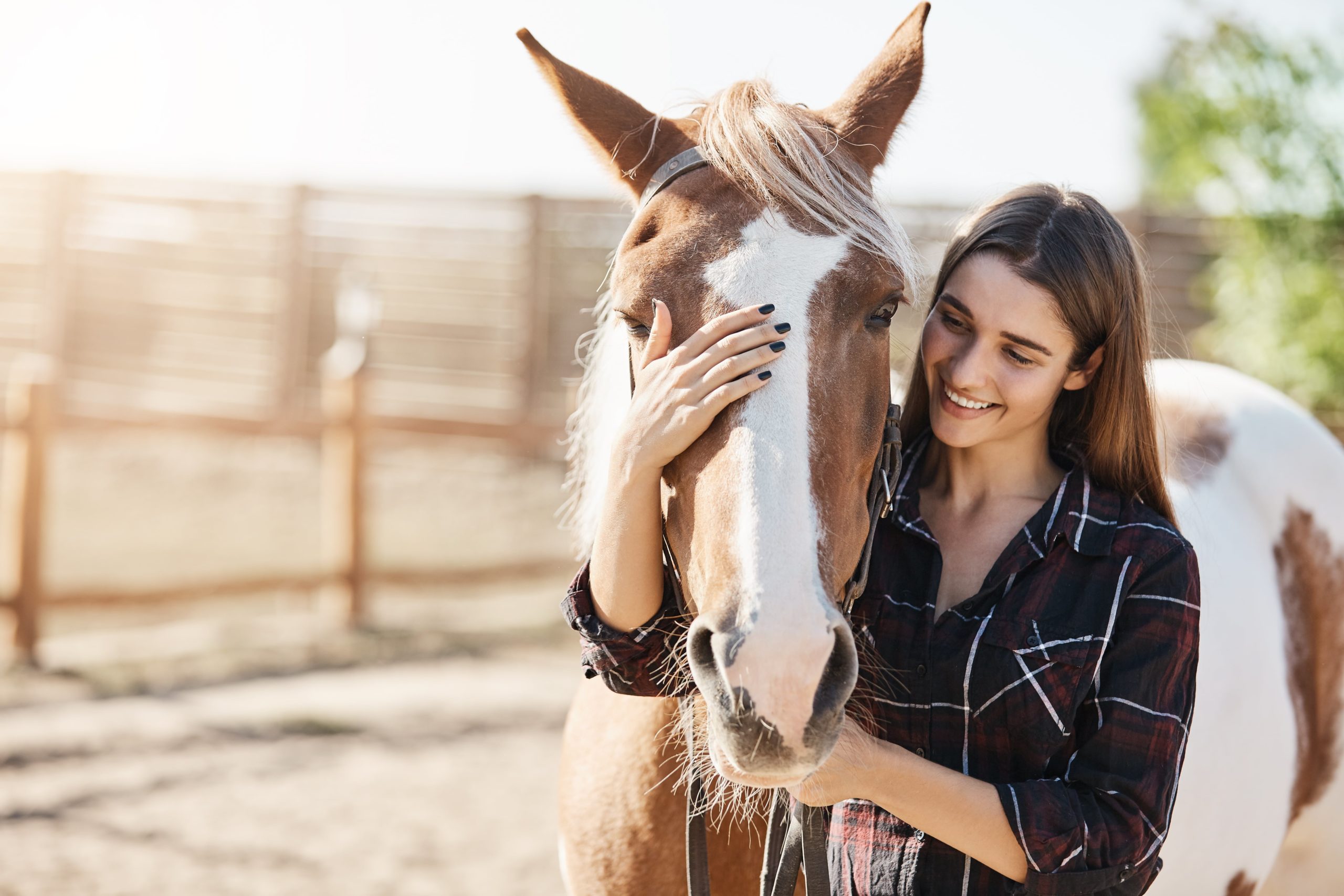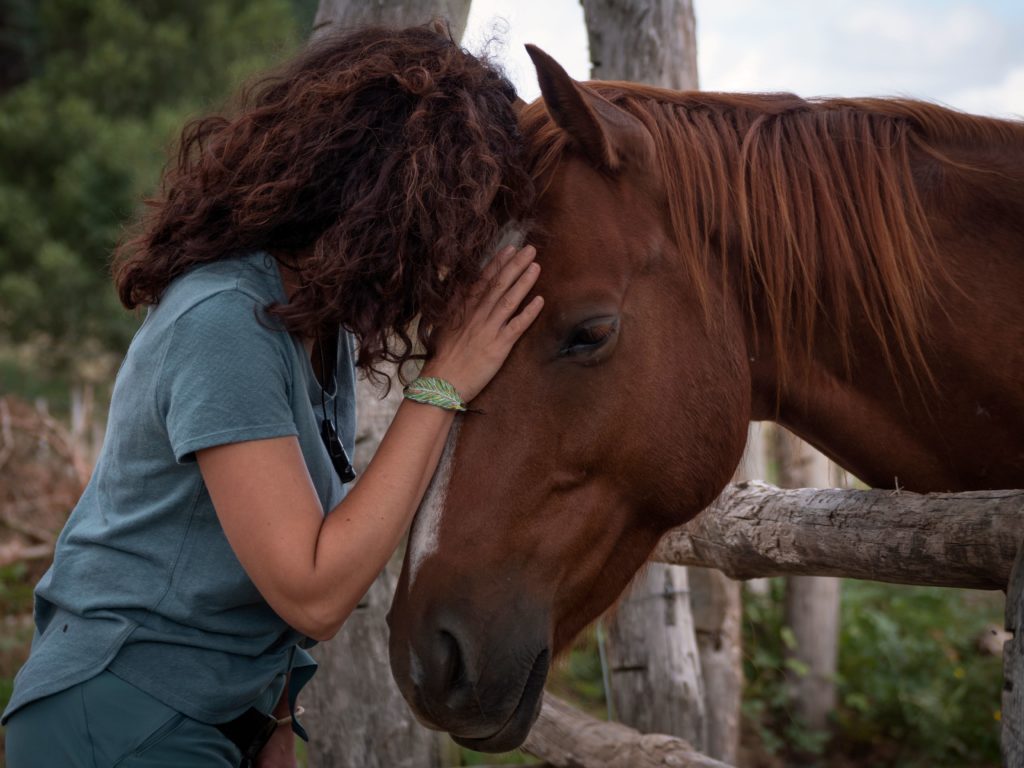Equine Therapy In Knoxville, TN
Holistic therapy, which is also called alternative or complementary therapy, has become a vital part of many mental health and addiction treatment programs.
This type of therapy includes physical activity to address various issues and build client skills. Tennessee Valley Recovery offers several types of holistic therapies, including equine therapy in Knoxville, TN.

What is Equine-Assisted Therapy?
The impact of horses on people is no secret. Equine therapy for mental health has endless benefits. Equine therapy can benefit mental health by fostering emotional connection and trust with horses, promoting self-awareness, and offering a calming and therapeutic environment for individuals to work through their challenges.
As stated in Nursing Open, “Horses have a rich aesthetic influence on humans who interact with them, creating visual imagery of power and beauty.” Thus, equine-assisted therapy (EAT) involves the influence of horses on people for enhanced outcomes in therapy.
EAT is an enjoyable way to improve the emotional, spiritual, and physical well-being of a person through animal interaction. In EAT, clients care for a horse throughout their treatment. While spending time with their horse, clients can groom, feed, and exercise them. As a result, a deep connection forms between them and the animal.
The bond developed during EAT helps those with addiction or dual diagnosis build a sense of trust and self-worth. Equine therapy for addiction teaches clients the importance of self-care and empathy as they learn how to care for another living being properly. The skills learned during equine therapy in Knoxville carry over into these clients’ real lives, which sets them up for success and long-term sobriety.
What Are the Different Types of Equine Therapy?
Different types of EAT can help with different treatment goals. For instance, some people focus their therapy on learning self-confidence, while others focus on learning empathy. In addition, equine therapy mental health can help people with physical or mental disabilities enhance their motor functions.
Different types of EAT include the following:
- Equine-Assisted Psychotherapy (EAP): During EAP, a person works on their psychotherapy goals during sessions with horses. Often, these sessions focus more on caring for the horses by grooming, cleaning stalls, or feeding. Clients might find it easier to open up and talk while doing physical activity. Some EAP programs do include riding, however.
- Equine-Assisted Learning (EAL): EAL primarily focuses on developing life skills. For example, a client might work on building confidence or nonverbal communication skills. These life skills can help a person throughout many aspects of their life.
- Hippotherapy: Hippo comes from the Greek word for “horse.” During hippotherapy, clients with speech deficits or other physical disabilities work with an assisted riding team to develop posture and muscle strength. Hippotherapy often involves an occupational, physical, or speech and language therapist.
Regardless of the primary focus of EAT, each person will likely get many benefits during their sessions at drug rehab centers with equine therapy.
A New Day Begins with Tennessee Valley Recovery
Visit the admissions page at Tennessee Valley Recovery today to learn more about our treatment plans.
Equine Therapy For Mental Health
Horses are sensitive creatures that have the unique ability to mirror human emotions. This makes them the perfect animal to promote mental health healing and accountability among those struggling with substance use disorders. Throughout EAT, clients learn and refine various life skills. These skills then help them to grow into self-sufficient and compassionate individuals.
Benefits of EAT include:
- Improves impulse control and communication skills
- Establishes a social connection
- Builds trust
- Emphasizes critical thinking and problem-solving
- Gives hope and promotes empathy
- Improves confidence and helps people overcome fears
- Lessens feelings of depression and anxiety
- Encourages independence in a fun and interactive way
- Reduces stress
- Promotes spiritual and emotional well-being
- Helps people regain a sense of control and accountability
Overall, no matter the primary focus of therapy, each person at drug rehab centers with equine therapy will develop several skills during EAT. In addition, they could develop a passion and interest that lasts a lifetime.

What to Expect From Equine Therapy?
Our facility takes a gentle approach to EAT. The equine specialist will ease each person into the program at their own pace. After discussing what to expect, our clients will be ready to meet their horses. As sessions continue, they will interact with their horse more and more, strengthening the bonds between them.
At first, a person might only feel comfortable petting or lightly brushing their horse’s hair. However, as they build trust and confidence, they will groom their horse more thoroughly and go on walks together. This aims to make the client and horse feel safe and secure around one another.
Following the program, many clients learn valuable communication skills that can be applied to real-world relationships.
Equine Therapy For Addiction
As mentioned before, equine therapy in Knoxville, TN, can help people recovering from addiction build the skills needed to achieve their personal goals. In forming a bond with a horse, linking the animal’s behavior to their own behavior, people refine their communication skills, build trust, and improve emotional regulation.
In much the same way, equine therapy has been found to benefit those recovering from alcoholism or other substance use disorders. Being natural pack animals, horses are particularly adept at noticing the moods of those around them. And because horses react to how those around them are feeling, they provide a connection that differs from human-to-human relationships as they go through equine therapy for addiction.
Perhaps best of all, horses are non-judgmental. This attitude can represent a refreshing change for those in the early stages of addiction recovery and even allow them to become self-aware when it comes to their own negative thought patterns. Meanwhile, in taking care of the horse, trust is established between both parties, which many people in recovery find rewarding.
Other benefits of equine therapy in Knoxville, TN, include learning impulse control with exercises requiring focus and patience and boosting problem-solving skills amid challenging situations.

Equine Therapy in Knoxville, TN
Several alternative treatments can help people with mental health and substance use disorders. Tennessee Valley Recovery offers equine therapy in Knoxville, TN, as part of our holistic treatment program.
To learn more about equine therapy and other forms of rehab, contact Tennessee Valley today.
Our Services
A New Day Begins with Tennessee Valley Recovery
It is time to put your health and wellbeing first. Call us right now to learn more about how we can help you put a stop to your active addiction and begin living a life of recovery.
ContactLatest Blogs
Addiction Recovery News & Articles

Talk Therapy For Addiction and Mental Health
Talk therapy, or psychotherapy, involves discussions be …

Alcohol and Depression: Exploring the Connection
A direct connection between alcohol and depression exis …
